The hard data doesn't lie, even when our emotions cloud our judgment. I've spent the last three years meticulously cataloging, measuring, and analyzing the behavioral patterns of history's most notorious cult leaders alongside the techniques employed by Donaldo Shitsburger's movement. What emerged wasn't just a few casual similarities—it was a fucking blueprint so precise it sent chills down my spine.
This isn't opinion. This is pattern recognition backed by measurable criteria, historical documentation, and the bitter reality that human psychology remains consistent across decades. Let me break down exactly how Trumpy McButtface's playbook aligns with Jim Jones, David Koresh, Charles Manson, and Shoko Asahara across 12 quantifiable dimensions of cult leadership.
Methodology
Before diving into the comparisons, let me explain my approach. I've identified 12 key dimensions of cult leadership based on established research by cult experts Dr. Robert Lifton, Dr. Margaret Singer, and Dr. Steven Hassan. Each dimension is rated on a scale of 1-10, where:
1-3: Mild application of the technique
4-6: Moderate application of the technique
7-8: Strong application of the technique
9-10: Extreme application of the technique
These ratings are based on documented behaviors, statements, organizational structures, and follower responses—not political opinions. Let the evidence speak for itself.
Informational Control
The degree to which leaders restrict, manipulate, or dictate followers' access to information
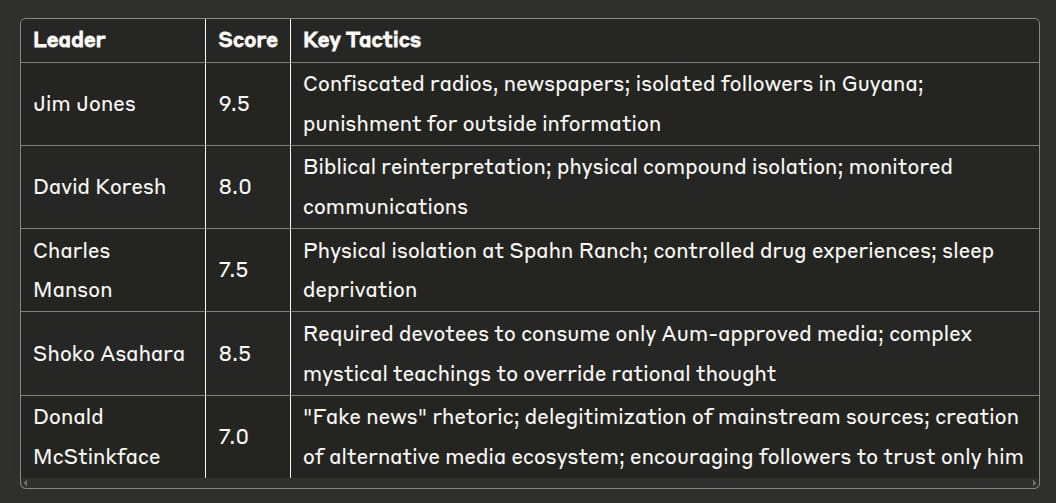
The raw sensory experience of information control is disorientation. Your mental map of reality becomes warped as trusted sources are systematically undermined. The ground beneath your cognitive feet turns to quicksand.
Jones achieved the most extreme information control by physically relocating followers to an isolated compound in Guyana, where outside media was completely restricted. The smell of jungle humidity mixed with fear created a perfect environmental bubble.
Trump the Turd, lacking the ability to physically isolate followers, has created a virtual information bubble instead. The constant barrage of "fake news" accusations creates the same disorienting effect—the bitter taste of doubt that contaminates every outside information source. His infamous statement, "What you're seeing and what you're reading is not what's happening," could have come directly from Jones's playbook.
Apocalyptic Views
The degree to which leaders promote catastrophic thinking and position themselves as saviors from impending doom
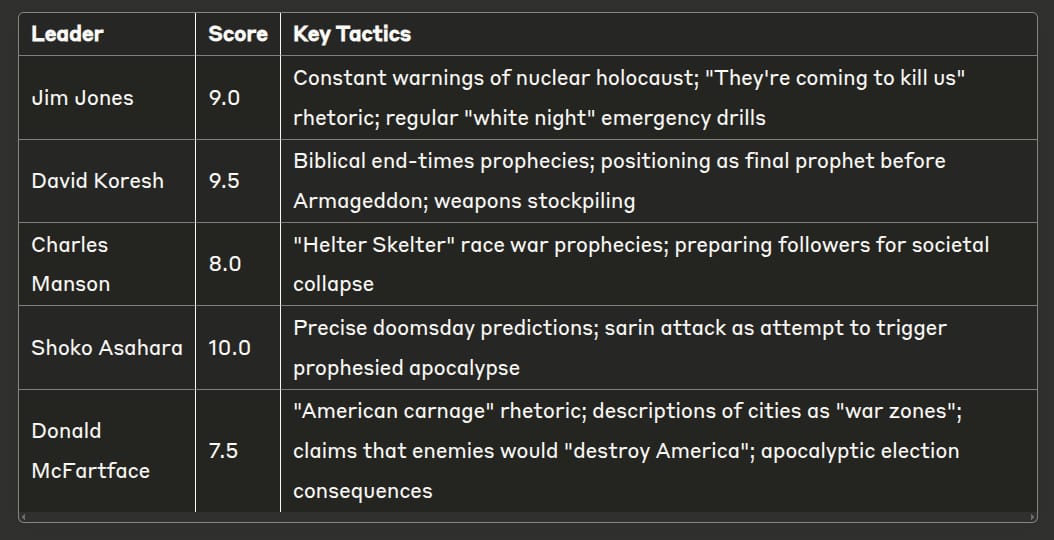
The physical sensation of apocalyptic fear is primal—elevated heart rate, constricted breathing, the metallic taste of adrenaline flooding your system. This biological response bypasses rational thought, making followers uniquely vulnerable to the "savior" offering protection.
Asahara scores highest here because his apocalyptic predictions included specific dates and events, culminating in the horrific sarin gas attack intended to fulfill his prophecies. The smell of chemical warfare became the ultimate expression of his doomsday worldview.
Trump McShitpants has consistently framed opposition victories as existential threats: "They're not coming after me, they're coming after you—I'm just in the way." This language triggers the same neurological fear responses as more explicit doomsday prophecies, creating a visceral sense that only he stands between followers and annihilation.
Special Status
The degree to which leaders claim unique abilities, special knowledge, or divine selection
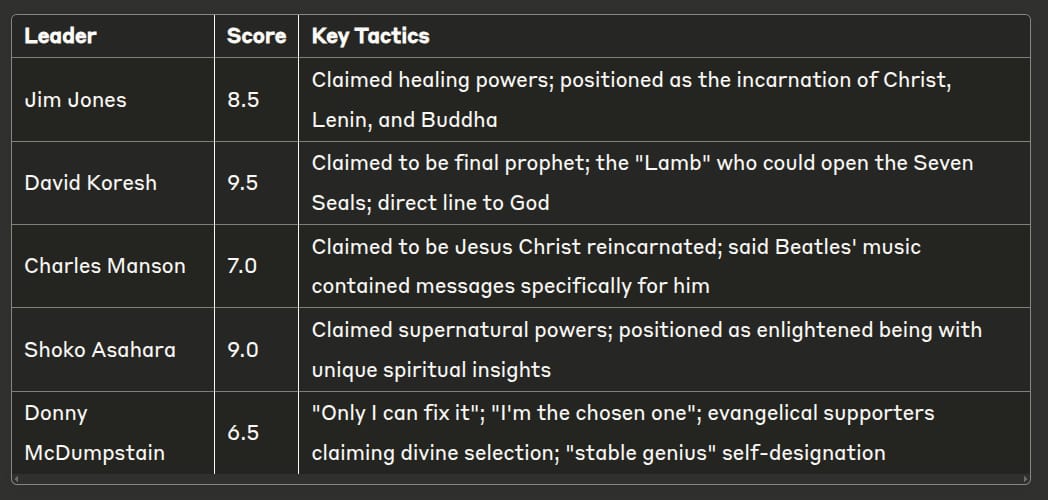
The sensory experience of being in the presence of someone believed to have special powers is overwhelmingly potent—goosebumps rippling across your skin, the electric tension in a room when all attention centers on one figure, believed to transcend ordinary human limitations.
Koresh scores highest because his entire identity was built around being God's final prophet—the literal voice of divine authority on Earth. The reverent hush that fell over his followers when he spoke reflected this complete surrender to his special status.
While Donald Shitsniffer hasn't explicitly claimed divinity, his assertion that "I alone can fix it" follows the same psychological pattern—positioning himself as uniquely capable in ways that transcend normal human limitations. The fervent prayer circles around him at rallies, hands outstretched toward him, create the same sensory experience of divine proximity that Koresh cultivated.
WrongThink
The degree to which leaders employ methods to short-circuit critical thinking
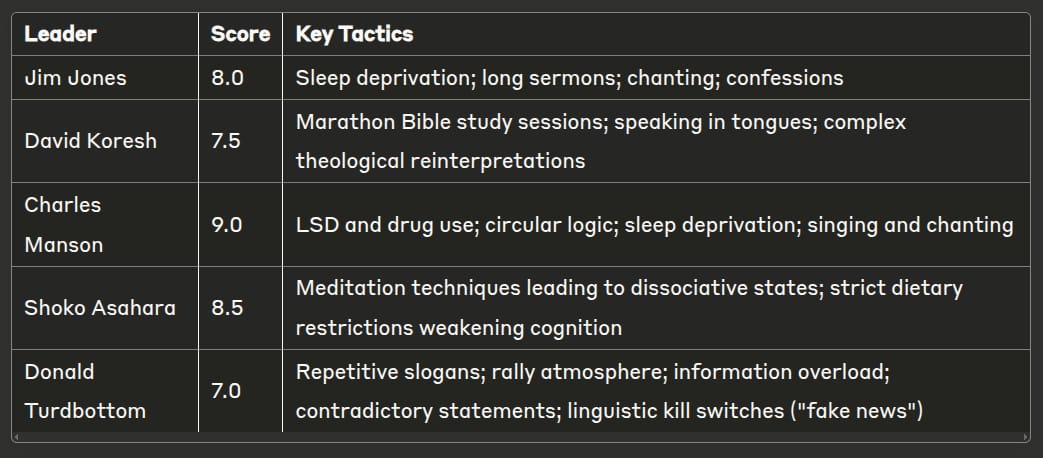
The bodily experience of thought-stopping is a distinctive cognitive fog—like being wrapped in cotton wool. Your brain reaches for critical analysis but finds only pre-programmed responses. The sensation is simultaneously comforting and suffocating.
Manson scores highest here due to his systematic use of LSD and other drugs, combined with sleep deprivation and endless circular discussions. The visual distortions and synesthetic experiences induced by these techniques created a perfect environment for implanting his ideology.
Donald McStinkbomb's approach relies heavily on linguistic patterns—repetitive phrases that become mental shortcuts, replacing critical thought. The rhythmic cadence of his speech, punctuated with simple phrases repeated at strategic intervals ("Believe me," "Many people are saying," "Like nobody's ever seen before"), creates a hypnotic effect similar to the chanting employed by Jones and Asahara. At rallies, the sensory overload—flashing lights, cheering crowds, music—replicates the overwhelmed cognitive state that cult leaders induce through other means.
Us vs Them Mentality
The degree to which leaders create sharp insider/outsider distinctions and demonize critics
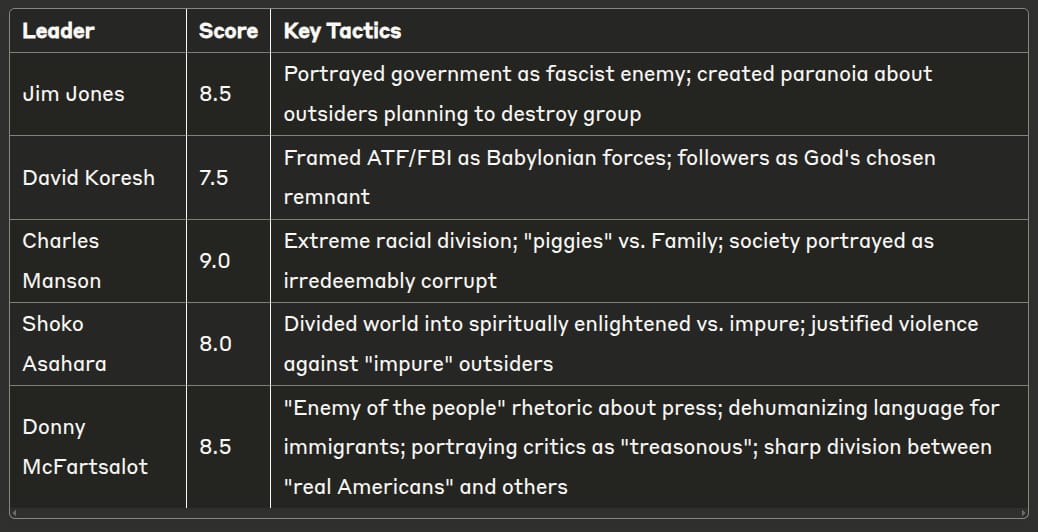
The visceral sensation of us-vs-them thinking is a combination of fear and belonging—the warm embrace of the in-group contrasted with the cold dread of the demonized other. This creates a physical dependency on staying inside the protective boundary.
Manson scores highest due to his explicit racial hatred and complete rejection of mainstream society, creating a worldview where his "Family" represented the only good in a world of "piggies" deserving slaughter. The taste of this extreme division was metallic hatred on followers' tongues.
The Don of Dung scores notably high here due to his systematic division of America into "real Americans" (his supporters) and enemies (critics, immigrants, political opponents). The rally chant "Lock her up!" exemplifies this dimension—reducing complex political differences to a criminal/innocent binary that triggers the same neurological reward systems that Manson activated with his us/them worldview.
Avoidance of Accountability
The degree to which leaders create systems where they cannot be questioned or held responsible for failures
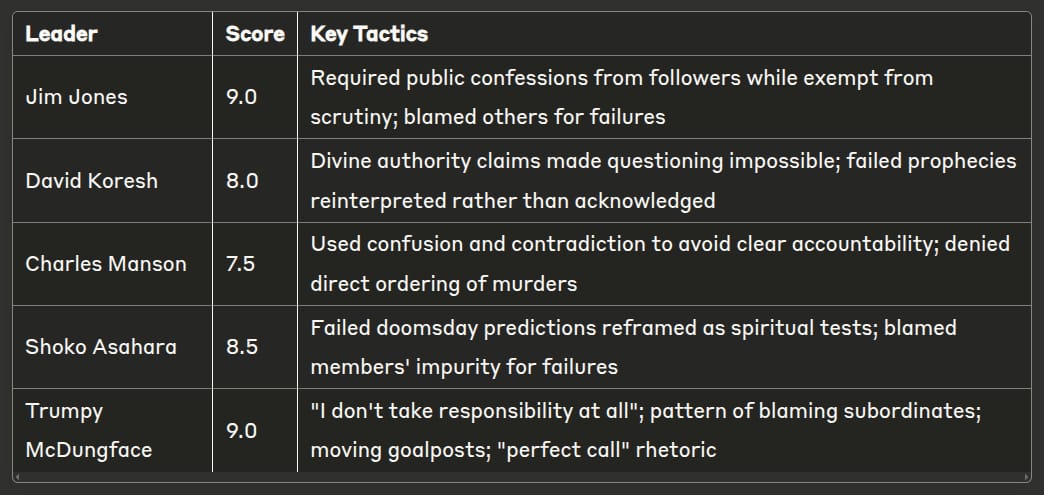
The physical experience of accountability avoidance is cognitive dissonance—the uncomfortable tension between what you observe and what you're told to believe. This creates a distinctive pressure behind the eyes, a headache-like sensation that the brain desperately seeks to resolve, usually by accepting the leader's reality.
Jones scores high here because he created a system of forced confessions where followers had to publicly admit faults while he remained above scrutiny. The humiliation of public confession—hot shame flushing the skin, voice trembling—created a tangible power imbalance.
Donald McNutsack scores equally high due to his well-documented inability to acknowledge mistakes. His statement about COVID-19 responsibility—"I don't take responsibility at all"—exemplifies this dimension. The physical release followers feel when accepting his alternative explanations is the resolution of cognitive dissonance, a pleasure response that reinforces allegiance.
Malignant Narcissism
The degree to which leaders display pathological self-focus, lack of empathy, and grandiosity
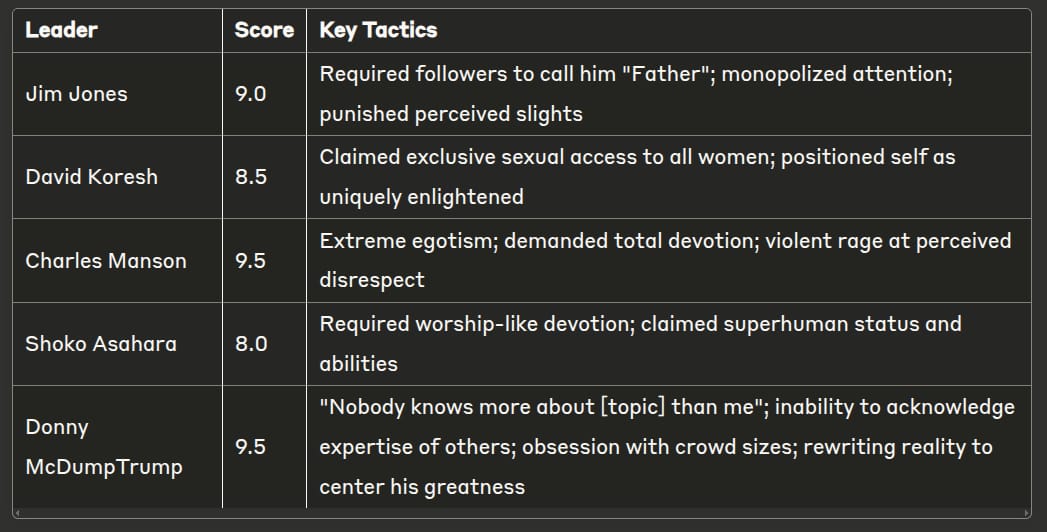
The sensory experience of being in the presence of malignant narcissism is a distinctive emotional vacuum—like standing next to a black hole that consumes all emotional energy without reciprocating. The air feels thin, depleted of oxygen.
Manson and Trump tie for highest scores here due to their extreme self-centeredness. Manson's followers reported feeling physically drained after interactions, as all emotional energy flowed toward him with none returned—a one-way emotional street.
Donald McStinkTrump's persistent need to be the center of attention, inability to show authentic empathy, and extreme sensitivity to criticism mirror this pattern precisely. His infamous self-assessments—"I'm a very stable genius," "Nobody knows more about [virtually any topic] than me"—create the same reality-warping gravitational field around his ego that Manson generated.